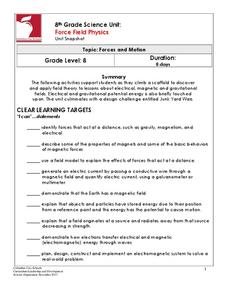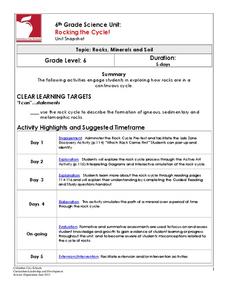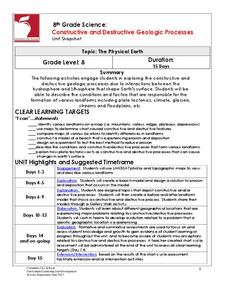Columbus City Schools
Force Field Physics
Attracted class members to an activity-packed journey through the science behind the invisible forces at work all around us. From jump rope generators to junkyard wars, there's never a dull moment when eighth grade physics scholars...
Columbus City Schools
Changes All Around Us
Whoa! What just happened? That's right, change is everywhere. But what exactly is changing? Middle school science sleuths get to the bottom of the changes matter can experience. Through simple demonstrations, engaging videos, and an...
NASA
Two Versions of Gravity: Newton and Einstein
We have all heard the debate about teaching both theories, but an innovative lesson takes the discussion to a new level. Scholars research and debate Newton's Law of Gravitation versus Einstein's General Theory of Relativity with...
NASA
Just How Far is That Star?
Pupils often wonder how we know the distance to various stars. Starting with a thought experiment and progressing to a physical experiment, they determine the brightness and distance to various stars. The evaluation requires critical...
Columbus City Schools
Keeping It Hot!
Hot off the presses, this collection of thermal energy activities, lessons, and printables is sure to amaze. Demonstrate how thermal energy moves about in a system using simple materials. Pupils demonstrate their understanding...
Columbus City Schools
Get Your Organisms Organized
From large to small, show your class how to organize them all! Included within the guide is everything you need to take their knowledge of classification from the cellular to the species level. The worksheets focus on building vocabulary...
NASA
Dark Matter NASA Conference
Young scholars calculate the escape velocity of planets in our solar system and use that knowledge to calculate the escape velocity for NGC 2300 group. They then suggest reasons for the escape velocity to be higher than possible given...
NASA
The Cycle of Matter
An educational lesson focuses on the idea of conservation of matter through a demonstration of the water cycle, a discussion of digesting food, and the path of carbon and oxygen atoms as they change form.
Science 4 Inquiry
Expanding the Universe
When Einstein first heard the theory of the expanding universe, he dismissed it as bad physics. Now scholars learn about the theory and how scientists prove it has merit. Through a hands-on simulation and videos, class members measure...
NASA
Determining the Nature, Size, and Age of the Universe
Prompt scholars to discover the expansion of the universe themselves. Using photographs of other galaxies, they measure and then graph the size and distance of each. Finally, they draw conclusions and prove the universe is expanding.
NASA
Measuring Dark Energy
You're only 10 minutes late? Do you know how much the universe has expanded in those 10 minutes? Scholars graph supernovae based on their redshift and see if the results verify Hubble's Law. If it does confirm it, the universe is...
University of California
Energy and Biomass Pyramids
Young scientists play tag as they act out the food pyramid in the ocean ecosystem. Energy circles pass from the smaller prey to the predators and at the end of the activity, a data chart and analysis questions allow pupils to apply their...
Chicago Botanic Garden
Food for Thought: Climate Change and Trophic Cascades
Learners examines the arctic food web with a short video about polar bears and an article about bears and warming temperatures. They design an arctic food web and discuss the trophic cascade that could come from climate change.
Columbus City Schools
History Helps When It Comes To Plate Tectonics
Get ready to move, shake, slip, and slide with a well-rounded plate tectonics unit! The engaging resource includes everything you need to inspire eighth grade science scholars, from worksheets to demonstrations. Assess their...
Columbus City Schools
What’s Up with Matter?
Take a "conservative" approach to planning your next unit on mass and matter! What better way to answer "But where did the gas go?" than with a lab designed to promote good report writing, research skills, and detailed observation. The...
Columbus City Schools
Photosynthesis and Respiration
Thirty percent of the world's oxygen is produced by rainforests found throughout the world. Seventh grade learners explore the processes of photosynthesis and respiration through 10 days of labs, manipulatives, and discussions. They...
Columbus City Schools
The Mystery of Earth’s History
Every living creature can leave a fossil record, yet most fossils belong to extinct organisms rather than ones currently living. Scholars learn about dating rock layers, fossils, and the environment of the past. Pupils understand that...
Columbus City Schools
Rocking the Cycle!
Time to rock out! Discover the "life" cycle of the average rock using an illustrative stations lab and stimulating pairs game. Roll the dice to determine your fate: will it be melting in magma or chilling out to form igneous rock? The...
Columbus City Schools
Constructive and Destructive Geologic Processes
Show the class the world as they've never seen it before—from way above! Learners try to unravel the mysteries presented by rich satellite imagery, learn to interpret topographic maps, and study erosion by constructing their very own...




















